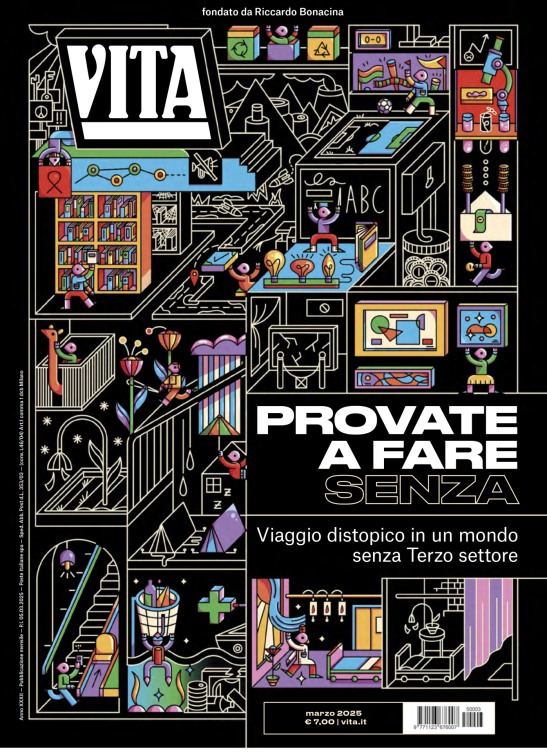Non profit
Cultural heritage’s big bang
Interview with Sergio López Figueroa, founder of Big Bang Lab
Sergio López Figueroa, 44, is a Spanish cultural and social entrepreneur, based in London, UK. The director and founder of Big Bang Lab, a consultancy and creative development agency with a global outreach, his work is quite individual.
“If you look around, there are lots of social enterprises but very few cultural enterprises with a social focus.”
A composer with a classical and film music background, originally from the Canary Islands, Spain, he went on to specialise in new music for silent films in the UK, winning an award for his score of Un Chien Andalou.
He is the creator of the concept of Cultural Social Responsibility, currently developing partnerships to establish the first Cultural Social Responsibility programme in cities around the world through the Global City Symphony.
In 2009, he undertook the realisation of the Global City Symphony in Delhi, India, making a silent film, called Delhi City Symphony.
What is working in the cultural sector in the UK like?
When you mention the word culture to social enterprises in the UK they say that there are other issues, like the environmental issue, which are more important and that there’s no reason to have concerns about culture.
Unlike European countries, especially Mediterranean countries where cultural identity is very alive and where you have real regional diversity, people in the UK see culture as art. This happens because the Anglo-Saxons are more pragmatic. They are interested in commercialisation. If you look around there are lots of social enterprises but very few cultural enterprises with a social focus. It’s quite sad, I feel a bit isolated.
What does Big Bang Lab do?
Big Bang Lab is a cultural, social enterprise and creative development agency working from consultancy to production across digital media, film, music and heritage. We are looking at cultural heritage as a social innovation tool. We design and implement programmes that transform the use of assets, archives and the intangible knowledge of old generations and memories to new products and services that will enable communities to make it relevant and become a sustainable source of development.
What is your main aim?
We are still young, but our aim is to create new market opportunities to emerging filmmakers and composers, engage them in transferring those skills for positive activism and social impact.
We created the concept of Cultural Social Responsibility, looking at partnerships and measurable outcomes rather than simply outputs. We provide CSR programmes to corporations taking into account their heritage, whilst facilitating the access to audiovisual archives – corporate or public – and research data to empower civic action.
What is your ultimate goal?
Our ultimate goal is to provide systemic change looking at cultural heritage from a creative, entrepreneurial and socio-economic development point of view whilst creating a movement towards global citizenship.
How was the Delhi City Symphony project born?
The Delhi City Symphony project was the outcome of a British Council award and of the Cultural Leadership Programme, which aims to provide training for cultural leaders. The project was undertaken with underprivileged children living in sheltered homes in Delhi who were involved in the making of a silent film about Delhi’s life and heritage. The music soundtrack was created in partnership with a group of classical Indian musicians: the contents of the film were generated by the community. Our main partner was Prayas, one of India’s largest NGOs, which goal is to protect the rights of marginalised children.
How did you go from the pilot project to launching the Global City Symphony?
We want to expand the work done in Delhi in a network of cities called the Global City Symphony with a new programme every three years. The next programme will involve 150 young people in Delhi and it will aim at improving Delhi’s underprivileged people’s lives.
Why silent films?
Because they are global languages, you can understand them without the barriers of language.
What kind of impact are you seeking to have?
Global City Symphony’s focus is to give voice to communities about the future of their cities and then generate income in order to transform excluded communities into social and cultural entrepreneurs in their own city. The idea is they could then create a public and private partnership for social change there. The use of digital media, broadcast and digital video contributes to urban regeneration in terms of community development.
How was the concept of Cultural Social Responsibility born?
The concept came after the project in Delhi, where I worked with underprivileged children who connected me with a deep sense of personal responsibility.
It is a new form of CSR incorporating creative private and public partnerships with other individuals and organisations interested in exploring the value of cultural diversity. It aims at social change, intercultural cooperation, measurement and knowledge transfer to achieve specific socio-economic development.
I would like to bring to your attention a petition I presented and a fundraising campaign:
1) PETITION
I recently created an open call with an open proposal to get supporters for the Global City Symphony project: www.change.org/bigbang-lab.
Attached (click on “Attachments” under Sergio López’s picture on this page) a copy of the letter to support Global City Symphony.
2) WEBSITE DEVELOPMENT
I am using a CD of the silent film for Un Chien Andalou to fundraise towards the development of a website and a network for Global City Symphony.
Information here: http://www.bigbang-lab.com/wordpress/news
http://www.vimeo.com/bigbanglab
Cosa fa VITA?
Da 30 anni VITA è la testata di riferimento dell’innovazione sociale, dell’attivismo civico e del Terzo settore. Siamo un’impresa sociale senza scopo di lucro: raccontiamo storie, promuoviamo campagne, interpelliamo le imprese, la politica e le istituzioni per promuovere i valori dell’interesse generale e del bene comune. Se riusciamo a farlo è grazie a chi decide di sostenerci.
